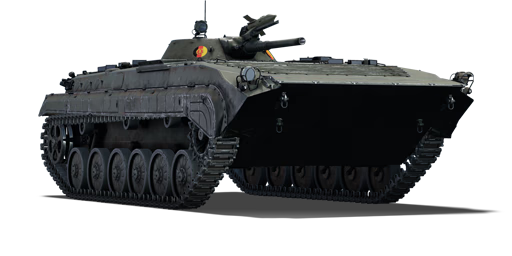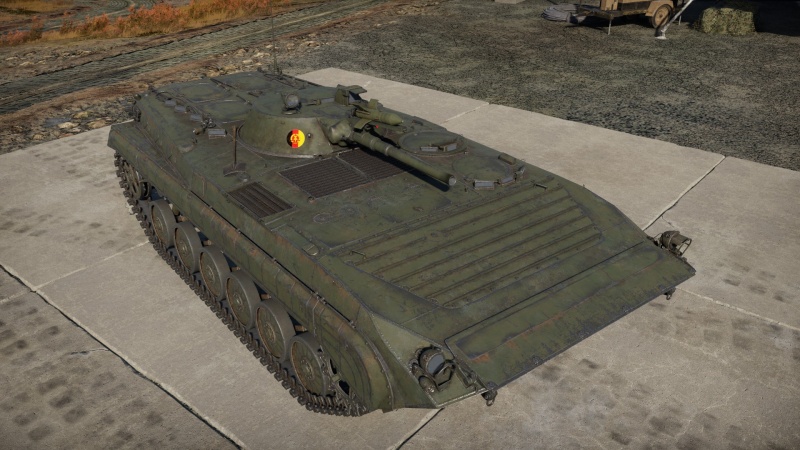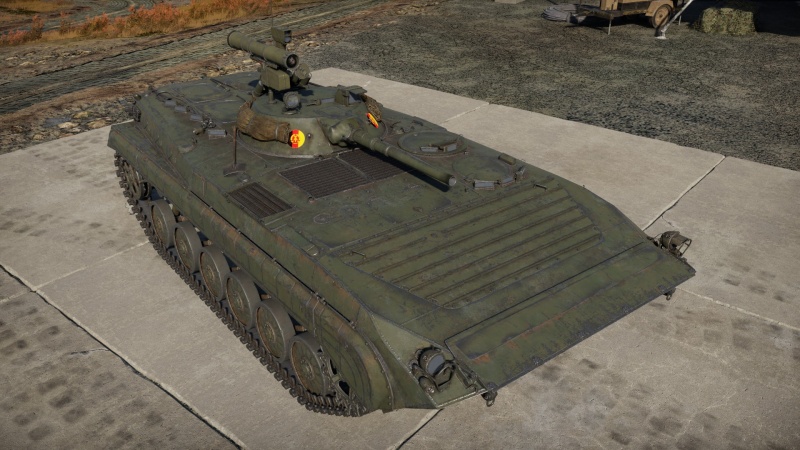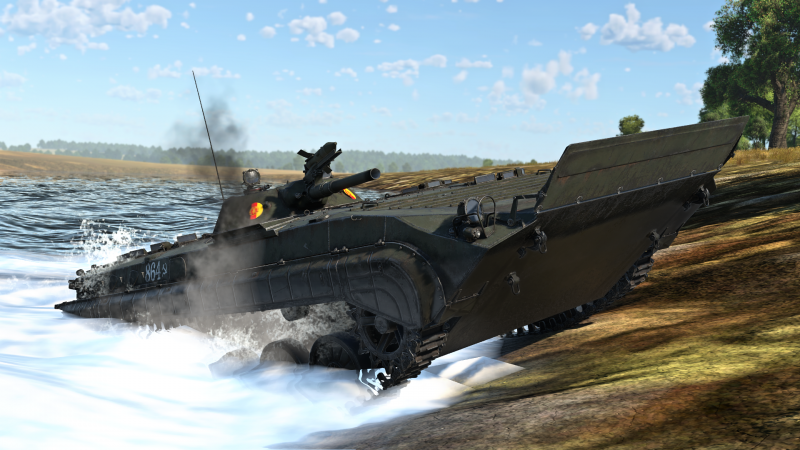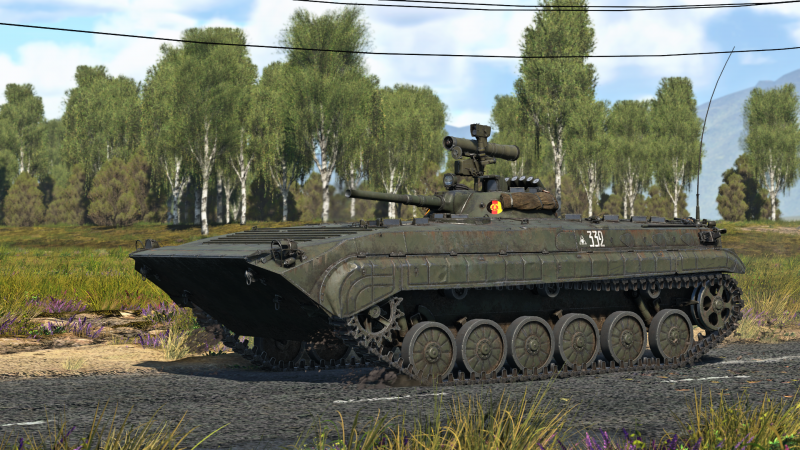SPz BMP-1
| This page is about the German light tank SPz BMP-1. For other versions, see BMP-1 (Family). For other uses, see BMP (Disambiguation). |
Contents
Description
As part of the Cold War remilitarization, the growing East German National People's Army (NVA) began receiving BMP-1 infantry fighting vehicles (IFV) from both the Soviet Union and Czechoslovakia. Throughout the Cold War, the NVA would receive a total of 1,133 BMP-1s for use in their motorized rifle regiments. Following the reunification of East and West Germany, the Bundeswehr integrated the BMP-1 into its ranks in 1991, upgrading and modifying them into the BMP-1A1 Ost variant to meet Bundeswehr standards. The BMP-1 was eventually retired from service by 1994 and either scrapped or sold to other countries.
The German version of the SPz BMP-1 (Schützenpanzer, BMP-1) was introduced into War Thunder in Update 1.93 "Shark Attack". As an import, the SPz BMP-1 is similar to the Soviet Union's version with fast mobility, an assortment of dangerous armament, but paper-thin armour. The armament of a 73 mm HEAT warhead and a missile, either the MCLOS 9M14 or SACLOS 9M113, means the BMP-1 has more than enough firepower to take care of any enemy it encounters if it gets the first shot off. The BMP's mobility should allow it to get into places the enemy wouldn't expect it to be early in a match, and frequent repositioning is crucial as any incoming shots, even by autocannons and heavy machine guns, have the potential to penetrate the BMP-1's armour even from the front.
General info
Survivability and armour
The SPz BMP-1 has very little to speak of in the armour department. Minimal frontal and nearly non-existent side armour results in the vehicle being vulnerable to almost any incoming fire. As such, the vehicle's survivability stems entirely from its mobility and reasonably small profile. Where possible, utilise hills or other cover, only exposing as much of the vehicle as is necessary to engage an unaware target.
Despite the lack of armour, however, the SPz BMP-1 will, on occasion, survive hits unexpectedly - the internals of the vehicle are largely non-critical and many rounds will over-penetrate.
Armour type:
| Armour | Front (Slope angle) | Sides | Rear | Roof |
|---|---|---|---|---|
| Hull | 7-12 mm (80°) Front glacis 19 mm (56°) Lower glacis |
16 mm (3-18°) Top 18 + 4 mm Bottom |
16 mm (12°) Top 12 mm (48°) Bottom 12 mm (8-51°) Doors |
6 mm 5 mm Engine exhausts |
| Turret | 23 mm (0-53°) Turret front 33 + 26 mm Gun mantlet |
13-23 mm (24-37°) | 13 mm (23-26°) | 6 mm |
| Cupola | 7 mm | 7 mm | 7 mm | 7 mm |
Notes:
- Suspension wheels and tracks are 10 mm thick.
- Belly armour is 6 mm thick.
Mobility
| Game Mode | Max Speed (km/h) | Weight (tons) | Engine power (horsepower) | Power-to-weight ratio (hp/ton) | |||
|---|---|---|---|---|---|---|---|
| Forward | Reverse | Stock | Upgraded | Stock | Upgraded | ||
| Arcade | Expression error: Unexpected * operator. | 465 | Expression error: Unexpected round operator. | __.__ | |||
| Realistic | 265 | Expression error: Unexpected round operator. | __.__ | ||||
Modifications and economy
Armaments
Main armament
The 2A28 main cannon, despite being the main armament will more often than not act more as secondary armament, at least once the BMP-1P upgrade is researched, due to the 9M113 ATGM proving significantly more controllable and effective at all engagement ranges. Despite this, the PG-9 HEAT round proves valuable in a pinch, with well-placed shots able to disable critical components on most vehicles the SPz BMP-1 will face. Keep in mind that the SPz BMP-1 does not feature any sort of stabilisation at all, and due to its light weight, the gun is near impossible to get on target at speed.
The main cannon's primary drawback is its mediocre ballistic performance, with the HEAT round travelling at only 665 m/s and the HE round travelling at an abysmal 290 m/s.
| 73 mm 2A28 | Turret rotation speed (°/s) | Reloading rate (seconds) | Reloading rate BMP-1P (seconds) | |||||||||||
|---|---|---|---|---|---|---|---|---|---|---|---|---|---|---|
| Mode | Capacity | Vertical | Horizontal | Stabilizer | Stock | Upgraded | Full | Expert | Aced | Autoloader | Stock | Full | Expert | Aced |
| Arcade | 40 | -4°/+30° | ±180° | N/A | 19.04 | 26.35 | 32.00 | 35.39 | 37.65 | 6.00 | 6.50 | 5.75 | 5.30 | 5.00 |
| Realistic | 11.90 | 14.00 | 17.00 | 18.80 | 20.00 | |||||||||
The SPz BMP-1 will be manually loaded once the upgrade "BMP-1P" is unlocked.
Ammunition
When stock, all available ammunition for the weapon are unlocked - HEAT and HE.
Between the two, HE should be avoided as it only has 11 mm of penetration and 290 m/sec muzzle velocity. While the HEAT round has only 670 m/sec velocity, with some training it can be shot at targets over 1 km reliably.
The HEAT round has 300 mm penetration and very good damage output, single-shot destruction can be achieved quite often when shooting center mass, although larger tanks might give you some headache as they sometimes survive multiple shots.
| Penetration statistics | |||||||
|---|---|---|---|---|---|---|---|
| Ammunition | Type of warhead |
Penetration @ 0° Angle of Attack (mm) | |||||
| 10 m | 100 m | 500 m | 1,000 m | 1,500 m | 2,000 m | ||
| PG-9 | HEAT | 300 | 300 | 300 | 300 | 300 | 300 |
| OG-9 | HE | 11 | 11 | 11 | 11 | 11 | 11 |
| Shell details | ||||||||||||
|---|---|---|---|---|---|---|---|---|---|---|---|---|
| Ammunition | Type of warhead |
Velocity (m/s) |
Projectile mass (kg) |
Fuse delay (m) |
Fuse sensitivity (mm) |
Explosive mass (TNT equivalent) (g) |
Ricochet | |||||
| 0% | 50% | 100% | ||||||||||
| PG-9 | HEAT | 665 | 2.6 | 0 | 0.01 | 918.75 | 65° | 72° | 77° | |||
| OG-9 | HE | 290 | 3.7 | 0.05 | 0.1 | 735 | 79° | 80° | 81° | |||
Ammo racks
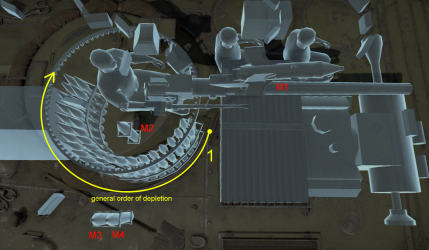
| Full ammo |
1st rack empty |
Visual discrepancy |
|---|---|---|
| 40 | 1 (+39) | No |
Notes:
- Shells are modeled individually and disappear after having been shot or loaded.
- The single ammunition rack consists of a shell barillet located around the turret basket.
Additional armament
9M14
The SPz BMP-1 comes with a rail-mounted manually guided ATGM as stock, initially aimed manually and with somewhat mediocre penetration and explosive mass values. While occasionally useful, generally the main gun is easier and more reliable to use. These missiles are first-generation, which means they cannot be aimed with the mouse pointer and are instead aimed with the WASD keys. However, the "BMP-1P" modification, when unlocked, will give the vehicle access to four more lethal 9M113 Konkurs missiles.
The 9M14 Malyutka ATGM steers very controllably. When fired, the 9M14 drops just slightly above your aim reticle and is not usable in the first 5 metres. After surpassing 5 metres, the ATGM will fly in a straight line without any oscillation or deviation. When using the hand aiming guidance of the ATGM, it is very accurate and flies with minimal error compared to the SACLOS (aim reticle guided) 9M113 Konkurs, that tends to be unpredictable and quite unstable in-flight. You can easily swap from target-to-target with the hand aiming guidance, as it remains steady and doesn't oscillate. If a target is too close to you, aim slightly below the point you wish to hit. The ATGM will align itself slightly above the aim reticle almost right away, allowing you to hit or eliminate the target at closer range.
9M113
Once the BMP-1P upgrade is researched, the rail-mounted 9M14 ATGM is replaced with a spindle-mounted 9M113 ATGM. This ATGM is significantly more powerful and easier to use due to its semi-automatic guiding system. Improved penetration values and significantly increased explosive mass will result in far more reliable destructive power. Keep in mind that the ATGM can only be fired when stopped or at extremely low speeds.
The 9M113 has 500 mm of penetration and do very good damage while having good speed. Only their manoeuvrability is a bit lacking, but you can quickly make a follow up shot with your cannon or use smoke if you want to retreat.
The 9M113 Konkurs ATGM steers rather unpredictably. When fired, the 9M113 drops below your aim reticle in the first 15 metres (due to being at low speed right after launch). After surpassing 15 metres, the ATGM will have accelerated enough to fly up and stabilize itself with your aim reticle. Due to this launch drop, it is suggested to aim slightly up when firing the ATGM: this will avoid having your ATGM hit the ground or any fences as sometimes that tends to happen. When the ATGM is flying, steer it gently and carefully. Instantly snapping to another target can cause it to oscillate from side-to-side and hit something on the way or miss the target entirely.
| 9M14 ATGM / 9M113 ATGM | Turret rotation speed (°/s) | Reloading rate (seconds) | |||||||||||
|---|---|---|---|---|---|---|---|---|---|---|---|---|---|
| Mode | Capacity | Vertical | Horizontal | Stabilizer | Stock | Upgraded | Full | Expert | Aced | Stock | Full | Expert | Aced |
| Arcade | 4 | -5°/+10° | -15°/+37° | N/A | 19.04 | 26.35 | 32.00 | 35.39 | 37.65 | _.__ | _.__ | _.__ | _.__ |
| Realistic | 11.90 | 14.00 | 17.00 | 18.80 | 20.00 | ||||||||
Note:
- The vertical and horizontal traverse depend on the turret position and are only relevant to the 9M113 ATGM.
Ammunition
| Penetration statistics | |||||||
|---|---|---|---|---|---|---|---|
| Ammunition | Type of warhead |
Penetration @ 0° Angle of Attack (mm) | |||||
| 10 m | 100 m | 500 m | 1,000 m | 1,500 m | 2,000 m | ||
| 9M14 | ATGM | 400 | 400 | 400 | 400 | 400 | 400 |
| Missile details | ||||||||||||
|---|---|---|---|---|---|---|---|---|---|---|---|---|
| Ammunition | Type of warhead |
Velocity (m/s) |
Range (m) |
Projectile mass (kg) |
Fuse delay (m) |
Fuse sensitivity (mm) |
Explosive mass (TNT equivalent) (kg) |
Ricochet | ||||
| 0% | 50% | 100% | ||||||||||
| 9M14 | ATGM | 140 | 3,000 | 10.9 | 0.05 | 0.1 | 3.25 | 80° | 82° | 90° | ||
| Penetration statistics | |||||||
|---|---|---|---|---|---|---|---|
| Ammunition | Type of warhead |
Penetration @ 0° Angle of Attack (mm) | |||||
| 10 m | 100 m | 500 m | 1,000 m | 1,500 m | 2,000 m | ||
| 9M113 | ATGM | 500 | 500 | 500 | 500 | 500 | 500 |
| Missile details | ||||||||||||
|---|---|---|---|---|---|---|---|---|---|---|---|---|
| Ammunition | Type of warhead |
Velocity (m/s) |
Range (m) |
Projectile mass (kg) |
Fuse delay (m) |
Fuse sensitivity (mm) |
Explosive mass (TNT equivalent) (kg) |
Ricochet | ||||
| 0% | 50% | 100% | ||||||||||
| 9M113 | ATGM | 248 | 3,000 | 14.5 | 0.05 | 0.1 | 4.37 | 80° | 82° | 90° | ||
Ammo racks

| Full ammo |
1st rack empty |
2nd rack empty |
Visual discrepancy |
|---|---|---|---|
| 4 | 3 (+1) | 1 (+3) | No |
Note:
- The missiles are listed from M1 to M4. M2 is the 1st rack. M3-M4 constitutes the 2nd rack.
Machine guns
The SPz BMP-1 comes equipped with a coaxial 7.62 mm PKT machine gun. This is only useful for clearing small obstacles or exposed crew in open-topped vehicles. The SPz BMP-1 is only equipped with one PKT machine gun with an ammo reserve of 1,000 rounds.
It's not useful and cannot aim at air targets due to the coaxial mount. As such, it should only be used on vehicles with soft armour like trucks or at exposed crew members, or just annoy enemies with it. In RB and SB, it can be used to throw up dirt in front of an enemy vehicle in order to blind them temporary.
| 7.62 mm PKT | ||||
|---|---|---|---|---|
| Mount | Capacity (Belt) | Fire rate | Vertical | Horizontal |
| Coaxial | 2,000 (1,000) | 700 | N/A | N/A |
Usage in battles
The BMP-1 is quite distinctive due to its oddly-shaped hull. The vehicle is crewed by only three (no commander), but is very spacious, so shots from the side occasionally cause minimal or even no damage. The BMP-1 is equipped with a short-barreled 73 mm gun (an odd calibre) firing exclusively anti-tank grenades. The projectile drop is extreme, albeit not the worst in-game, and it can be used to great effect against many of the vehicles the BMP will face due to the consistent 300 mm of penetration at range. The standard PG-9 ammunition has an explosive mass of about 1.25 kg. The trade-off, in this case, is the low velocity and relatively poor slope characteristics (the penetration drops in half if more than 60 degrees of slope). Finally, as standard, the BMP-1 is equipped with the 9M14 ATGM, capable of penetrating 400 mm and carrying an explosive mass of 2.6 kg. It is WASD guided, and therefore somewhat tricky to use at first (and especially difficult to use in high packet-loss or high ping matches). An optional modification for the BMP-1 allows it to use turret-mounted smoke grenades as well as a next-generation missile, the mouse-guided 9M113. Not only is the missile nearly twice as fast as the 9M14, but it carries a notably larger explosive payload, and can penetrate up to 600 mm at 90 degrees at any range.
The BMP-1 can also research NVD, which can help during night battles to help with visibility. NVD is available in commander, gunner, driver and outside viewports. Once purchased, the NVD modification also allows the use of a Infrared Spotlight to help illuminate targets if they are hard to see. However, it is mounted to the commander's hatch on the hull; while this allows it to rotate as long as the commander is alive, it will be stuck in place if the commander is knocked out.
Due to its nearly non-existent armour, the BMP-1 shouldn't be played like anything with actual armour. It is best used in a support or ambush role, using cover to ambush opponents, then taking them out with the combination of the autocannon and ATGM. The BMP-1 is quite effective when played this way. When in close-quarters combat, it is important to note that the missile launcher has slightly faster traverse than the turret. This can save it from being killed from the flanks. It can also be used to take out opponents from medium to long range with its missiles, although this strategy will prevent the BMP-1 from using its main gun. The small projectiles lose even more of their already small penetration at long ranges, but the missiles will not be affected by gravity or air resistance until very extreme ranges. Finally, the missiles and sometimes the autocannon can be used to take out slow air targets such as the helicopters that you will start to meet at these BR's.
Pros and cons
- Fairly mobile, both weapon systems are particularly effective against the lightly armoured vehicles it will encounter often such as the Leopard I, OF-40, etc.
- One of the earliest ATGM vehicles available and the earliest to receive mouse-guided (SACLOS) ATGMs (with the BMP-1P modification)
- Decent main gun HEAT round penetrating up to 300 mm of armour at any range, effective against last-gen heavy tanks like the Conqueror, M103, etc.
- Amphibious ability which can allow it to reach positions that other vehicles struggle to
- Functional even in uptiers, due to its piercing ATGM and HEAT
- All ammunition types are default and as such have no cost
- Night Vision allows effectiveness in night battles
Cons:
- Mediocre reverse speed, particularly for a light tank
- Default missiles are manually guided, upgraded missiles must be unlocked with the BMP-1P research
- Chemical ammunition only, may struggle to damage vehicles with ERA like the M60A1 RISE (P)
- All available ammunition is hyper-sensitive and will detonate on hitting light obstacles such as fences or bushes
- Somewhat large silhouette for a light tank. Will get seen and shot at easier
- Minimal gun depression makes it struggle on hills
- Has no stabiliser, accurate shots on the move or in water are often not possible
- Only three crew members, two of whom sit extremely close together, reducing the vehicle's survivability
- Vulnerable to heavy machine gun and light cannon fire, particularly from the sides or top. SPAA like the Gepard are a big threat
- Very vulnerable to aircraft and helicopters
- Bombs and artillery can deal significant damage, even when at a distance
- Infrared Spotlight mounted to commander's hatch, won't rotate with turret when the commander is knocked out
History
Development
In the 1950s, Soviet armoured personnel carrier (APC) tactics consisted of lightly armoured vehicles that would transport soldiers to combat zones, and then head back behind the lines to safety. During this time, the West German Bundeswehr was using the Schützenpanzer Lang and infantry fighting vehicle (IFV) tactics, where the vehicles would work with the infantry and tanks in order to support them, especially against lightly armoured targets. The BMP was a Soviet IFV design created in the late 1950's. Some of the requirements were the ability for all of the infantry carried to be able to fire from within the vehicle, which was unseen before in IFV designs. It was intended to support the infantry and combat enemy light vehicles. The design placed emphasis on speed and manoeuvrability, potent armament, and sufficient armament to protect against 23 mm autocannons over the frontal arc. There was a debate over how the vehicle should be wheeled or tracked, and a number of options were explored including hybrid designs with both. The design that was chosen was a tracked vehicle with the engine in the front and the crew compartment in the rear; it was designated the Object 764. A prototype was created in 1964, and the final design was chosen in 1965 - an improved model called the Object 765. In service the production model was called the BMP-1.
Design
The BMP-1 features a fully tracked hull, with a sharply angled glacis at the front, a centrally mounted turret, and a crew compartment in the rear of the hull, with doors for the infantry to mount and dismount the vehicle. The hull layout is as follows: the engine was in the front right section of the hull. The driver sat to the front left of the vehicle, the commander sat right behind the driver, and the gunner sat in the right side of the turret. The troop compartment located at the rear of the vehicle could seat 8 infantry soldiers. The ability to fire from inside the vehicle was provided by four firing ports on each side of the hull and one in the left door. There are also four hatches in the roof. The infantry sit on two benches with padding, back-to-back, facing the outer sides of the vehicle. The armour of the frontal arc is enough to generally protect against 20 mm autocannon fire, the side armour generally protects against 12.7 mm machine gun fire, and the roof and rear armour protects against small arms fire and shell fragments. In addition, the sloped glacis on the front of the hull also increased the chances of shells bouncing, because of the extreme angles. The protection level depended somewhat on the version of the BMP-1 in question, as different nations had differing levels of armour quality. The main armament consisted of a 73 mm 2A28 Grom smoothbore semi-automatic cannon, along with a 9M14 Malyutka anti-tank guided missile (ATGM). Secondary armament consisted of a 7.62 mm PKT machine gun. The engine provides 300 hp and is a six-cylinder four-stroke diesel engine. The suspension system used was a torsion bar suspension system. The BMP-1 is fully amphibious with little preparation. Before entering the water, a trim vane has to be raised, which provides additional frontal armour when in the lowered position. It can achieve 65 km/h (40 mph) on road and 8 km/h (5 mph) in water.
Production and Service
Over 20,000 BMP-1s were produced in the Soviet Union alone, with many more produced in China and Czechoslovakia. The BMP-1 was widely exported and saw significant combat worldwide. BMP-1s participated in the Yom Kippur War, the Angolan Civil War, the Iran-Iraq War, the Gulf War, and many other conflicts. It was well liked for its manoeuvrability, but it was found that the cannon lacked effective range and the 9M14 ATGMs were hard to control. During the Gulf War it was found that the 25 mm Bushmaster cannon found on the M2/M3 Bradley could consistently penetrate the frontal armour of the BMP-1, even at range.
BMP-1P Upgrade
The BMP-1P was an upgrade to the ATGM systems of the BMP-1. It replaced the 9M14 Malyutka missiles with 9M113 Konkurs or 9M111 missile. This increased the weight of the vehicle, leading to a slight decrease in manoeuvrability.
German Service
In 1974, East Germany ordered 1,133 BMP-1, and they were delivered between 1973 and 1989. Some of those BMP-1 were produced in Czechoslovakia. About 270 of the East German BMP-1's were of the BMP-1P type, with 950 being BMP-1SP2. The East German BMP-1P were known as the Schützenpanzer BMP-1P, or SPz BMP-1P. After the German reunification in 1990, the Bundeswehr modified 851 BMP-1 to NATO standards, and they entered service with the Bundeswehr as the BMP-1A1 Ost. Most of the vehicles upgraded were of the BMP-1P variant. In 1990, 110 unmodified BMP-1/BMP-1P were sold to Finland. 501 BMP-1A1 Ost. were sold to Greece between 1993 and 1994, and 350 were sold to Sweden in the early 1990's.
Media
- Skins
- Videos
See also
Links to the articles on the War Thunder Wiki that you think will be useful for the reader, for example:
- reference to the series of the vehicles;
- links to approximate analogues of other nations and research trees.
External links
References
- Bibliography
- David B. (2015, December 1). BMP-1. Tank Encyclopedia. https://tanks-encyclopedia.com/coldwar/USSR/soviet_BMP-1.php
- BMP-1. (2020, March 25). In Wikipedia. https://en.wikipedia.org/w/index.php?title=BMP-1&oldid=947316322
| Chelyabinsk Tractor Plant (Челябинский тракторный завод) | |
|---|---|
| IFVs | |
| BMP-1 | BMP-1 |
| Heavy Tanks | |
| KV | KV-85 · KV-122 |
| IS-1/2 | IS-1 · IS-2 · IS-2 (1944) · IS-2 "Revenge" · IS-2 No.321 |
| T-10 | T-10A · T-10M |
| Other IS Tanks | IS-3 · IS-4M |
| Tank Destroyers | |
| KV Derivatives | SU-152 |
| IS Derivatives | ISU-152 · ISU-122 · ISU-122S · Object 268 |
| Export | |
| IS-2 | ␗IS-2 · IS-2 No.402 · ␗IS-2 (1944) |
| ISU | ␗ISU-152 · ␗ISU-122 |
| IFVs | SPz BMP-1 |
| See Also | Leningrad Kirov Plant |
| Germany light tanks | |
|---|---|
| Pz.II | Pz.II C · Pz.II C (DAK) · Pz.II C TD · Pz.II F · Pz.Sfl.Ic |
| Sd.Kfz.234 | Sd.Kfz.234/1 · Sd.Kfz.234/2 · Sd.Kfz.234/2 TD |
| Marder | Marder A1- · Marder 1A3 · Begleitpanzer 57 · DF105 |
| SPz PUMA | PUMA · PUMA VJTF |
| Wheeled | Sd.Kfz.221 (s.Pz.B.41) · Class 3 (P) · Radkampfwagen 90 · Boxer MGS |
| Other | Ru 251 · SPz 12-3 LGS |
| Argentina | TAM · TAM 2C · TAM 2IP · JaPz.K A2 |
| Czechoslovakia | Pz.35(t) · Pz.38(t) A · Pz.38(t) F · Pz.38(t) n.A. · Sd.Kfz. 140/1 |
| France | Pz.Sp.Wg.P204(f) KwK |
| Lithuania | Vilkas |
| USA | leKPz M41 |
| USSR | SPz BMP-1 |


